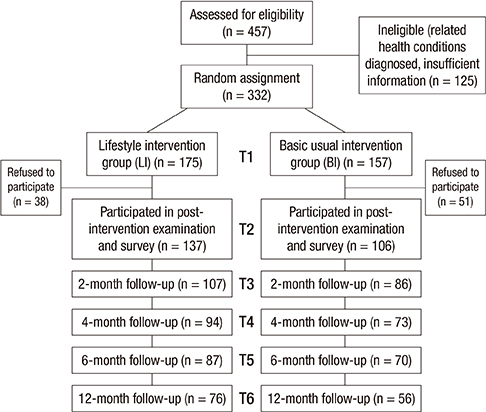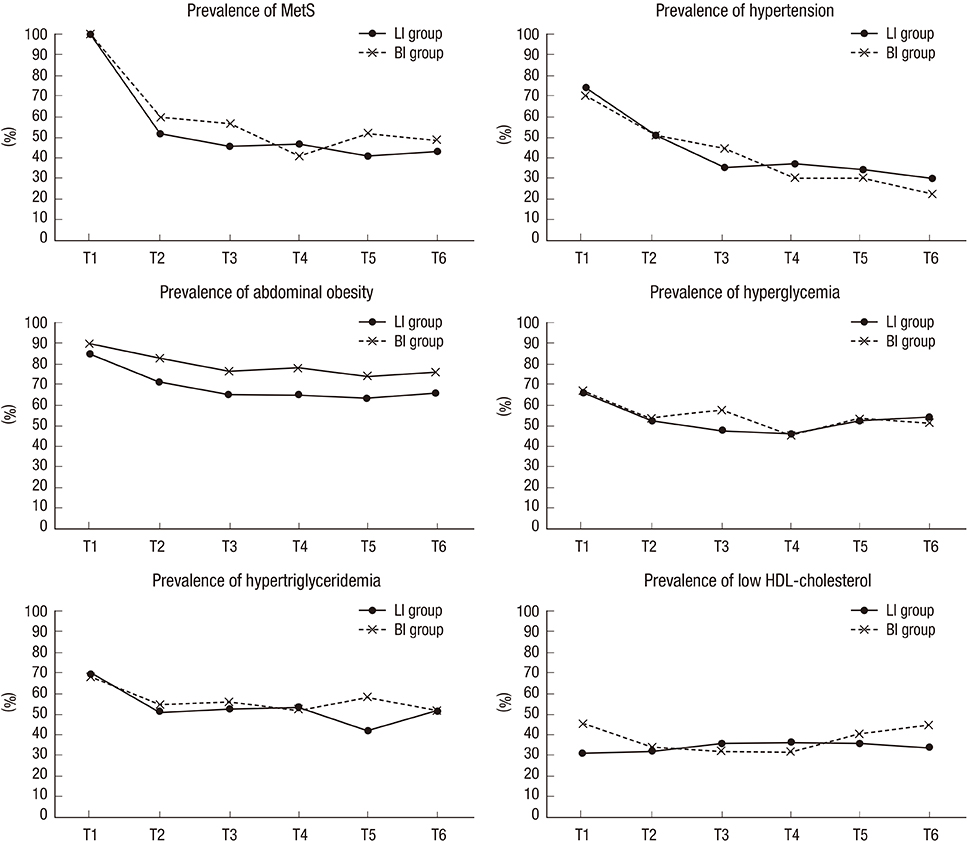J Korean Med Sci.
2015 Aug;30(8):1092-1100. 10.3346/jkms.2015.30.8.1092.
Routine Screening and Consultation Facilitate Improvement of Metabolic Syndrome
- Affiliations
-
- 1Graduate School of Public Health, Seoul National University, Seoul, Korea.
- 2Institute of Health and Environment, Seoul National University, Seoul, Korea.
- 3Department of Health Education and Management, Ewha Womans University, Seoul, Korea.
- KMID: 2164504
- DOI: http://doi.org/10.3346/jkms.2015.30.8.1092
Abstract
- This randomized controlled trial study aimed to investigate the effects of a lifestyle intervention on metabolic syndrome (MetS) among middle-aged Koreans. A total of 243 middle-aged Koreans with MetS were randomly assigned to either of 2 types of lifestyle intervention for MetS and followed for 12 months. Health examinations and interventions were implemented at 16 regional branch facilities of a Korean medical institution from 2010, following the NCEP-ATP III criteria and recommendations. Lifestyle intervention (LI) group (n = 137) participated in a 12-week multi-component intervention including individual counseling, group sessions, and self-help materials. Basic usual intervention (BI) group (n = 106) was provided with one-page health information sheet on MetS and MetS management at baseline. Prevalence of MetS and each of MetS components, except for low HDL-cholesterol, in both groups were significantly reduced and maintained after the intervention. Notably, prevalence of hypertension and abdominal obesity continued to improve during the follow-up period. Between-group differences in results were not found. Both interventions were effective when they were accompanied with repeated check-ups and notification of MetS status. It is recommended to design clear guidelines for the notification of MetS after MetS screening and to encourage checking MetS status periodically for effective MetS management (KCT 0000446).
MeSH Terms
Figure
Reference
-
1. Haffner SM, Valdez RA, Hazuda HP, Mitchell BD, Morales PA, Stern MP. Prospective analysis of the insulin-resistance syndrome (syndrome X). Diabetes. 1992; 41:715–722.2. Galassi A, Reynolds K, He J. Metabolic syndrome and risk of cardiovascular disease: a meta-analysis. Am J Med. 2006; 119:812–819.3. Kassi E, Pervanidou P, Kaltsas G, Chrousos G. Metabolic syndrome: definitions and controversies. BMC Med. 2011; 9:48.4. Mozumdar A, Liguori G. Persistent increase of prevalence of metabolic syndrome among U.S. adults: NHANES III to NHANES 1999-2006. Diabetes Care. 2011; 34:216–219.5. Fitch K, Pyenson B, Iwasaki K. Metabolic syndrome and employer sponsored medical benefits: an actuarial analysis. Value Health. 2007; 10:S21–S28.6. Misra A, Khurana L. Obesity and the metabolic syndrome in developing countries. J Clin Endocrinol Metab. 2008; 93:S9–S30.7. Xi B, He D, Hu Y, Zhou D. Prevalence of metabolic syndrome and its influencing factors among the Chinese adults: the China Health and Nutrition Survey in 2009. Prev Med. 2013; 57:867–871.8. Chan J. The metabolic syndrome: an Asian perspective. Diabetes Voice. 2006; 51:18–20.9. Patel A, Huang KC, Janus ED, Gill T, Neal B, Suriyawongpaisal P, Wong E, Woodward M, Stolk RP. Is a single definition of the metabolic syndrome appropriate?--A comparative study of the USA and Asia. Atherosclerosis. 2006; 184:225–232.10. Lim S, Shin H, Song JH, Kwak SH, Kang SM, Won Yoon J, Choi SH, Cho SI, Park KS, Lee HK, et al. Increasing prevalence of metabolic syndrome in Korea: the Korean National Health and Nutrition Examination Survey for 1998-2007. Diabetes Care. 2011; 34:1323–1328.11. National Health Insurance Service. National Health Screening Statistical Yearbook. Seoul: National Health Insurace Service;2012.12. Oh SW. Obesity and metabolic syndrome in Korea. Diabetes Metab J. 2011; 35:561–566.13. Oda BT. An alternative perspective to battling the bulge: the social and legal fallout of Japan's anti-obesity legislation. Asian Pac Law Policy J. 2010; 12:249–294.14. Grundy SM, Cleeman JI, Merz CN, Brewer HB Jr, Clark LT, Hunninghake DB, Pasternak RC, Smith SC Jr, Stone NJ. Coordinating Committee of the National Cholesterol Education Program. Implications of recent clinical trials for the National Cholesterol Education Program Adult Treatment Panel III Guidelines. J Am Coll Cardiol. 2004; 44:720–732.15. The Korean Academy of Family Medicine. Clinical practice guidelines for prevention and treatment of metabolic syndrome among Korean adults. Seoul: Korean Medical Guideline Information Center;2013.16. Tajima M, Lee JS, Watanabe E, Park JS, Tsuchiya R, Fukahori A, Mori K, Kawakubo K. Association between changes in 12 lifestyle behaviors and the development of metabolic syndrome during 1 year among workers in the Tokyo metropolitan area. Circ J. 2014; 78:1152–1159.17. Atlantis E, Taylor AW, Wittert G, Shi Z. Weight gain and lifestyle risk factors for developing metabolic syndrome. Circ J. 2014; 78:1066–1068.18. Yamaoka K, Tango T. Effects of lifestyle modification on metabolic syndrome: a systematic review and meta-analysis. BMC Med. 2012; 10:138.19. Kim H, Yoon S, Lee K, Oh S, Ryu H, Choo J, Lee K, Ryu B, Lee D, Park D. Effects of a self-management program for metabolic syndrome-a metabolic syndrome management program in Seoul. Korean J Health Educ Promot. 2011; 28:51–62.20. Seo JR, Bae SS. The effect of metabolic syndrome management program in a public health center. J Agric Med Community Health. 2011; 36:264–279.21. Dalle Grave R, Calugi S, Centis E, Marzocchi R, El Ghoch M, Marchesini G. Lifestyle modification in the management of the metabolic syndrome: achievements and challenges. Diabetes Metab Syndr Obes. 2010; 3:373–385.22. Shadish WR, Cook TD, Campbell DT. Experimental and quasi-experimental designs for generalized causal inference. Belmont, CA: Wadsworth Cengage Learning;2001. p. 261–262.23. National Institutes of Health. Third report of the National Cholesterol Education Program (NCEP) expert panel on detection, evaluation, and treatment of high blood cholesterol in Adults (Adult Treatment Panel III) Final Report. Washington, DC: Department of Health and Human Services;2002. NHI Publication No. 02-5215.24. Yoo S, Kim H, Cho HI. Improvements in the metabolic syndrome and stages of change for lifestyle behaviors in korean older adults. Osong Public Health Res Perspect. 2012; 3:85–93.25. Korea Association of Health Promotion, Health Promotion Research Institute. Lifestyle intervention study protocol. Seoul: Korea Association of Health Promotion;2013.26. holomew LK, Parcel GS, Kok G, Gottlieb NH, Fernández ME. Planning health promotion programs: an intervention mapping approach. 3rd ed. San Francisco, CA: Jossey-Bass;2011.27. Prochaska JO. Systems of psychotherapy : a transtheoretical analysis. Homewood, Ill: Dorsey Press;1979.28. Bandura A. Self-efficacy : the exercise of control. New York: W.H. Freeman;1997.29. Rossi PH, Lipsey MW, Freeman HE. Evaluation : a systematic approach. Thousand Oaks, CA: Sage;2004. p. 302–306.30. Wang X, Hsu FC, Isom S, Walkup MP, Kritchevsky SB, Goodpaster BH, Church TS, Pahor M, Stafford RS, Nicklas BJ. Effects of a 12-month physical activity intervention on prevalence of metabolic syndrome in elderly men and women. J Gerontol A Biol Sci Med Sci. 2012; 67:417–424.31. Nanri A, Tomita K, Matsushita Y, Ichikawa F, Yamamoto M, Nagafuchi Y, Kakumoto Y, Mizoue T. Effect of six months lifestyle intervention in Japanese men with metabolic syndrome: randomized controlled trial. J Occup Health. 2012; 54:215–222.32. Sim SR. Experiences of diagnosis and lifestyle management in individuals with metabolic syndrome. Seoul: Seoul National University;2013. Dissertation.33. McCambridge J, Witton J, Elbourne DR. Systematic review of the Hawthorne effect: new concepts are needed to study research participation effects. J Clin Epidemiol. 2014; 67:267–277.34. Bo S, Ciccone G, Baldi C, Benini L, Dusio F, Forastiere G, Lucia C, Nuti C, Durazzo M, Cassader M, et al. Effectiveness of a lifestyle intervention on metabolic syndrome. A randomized controlled trial. J Gen Intern Med. 2007; 22:1695–1703.35. Lindström J, Louheranta A, Mannelin M, Rastas M, Salminen V, Eriksson J, Uusitupa M, Tuomilehto J. Finnish Diabetes Prevention Study Group. The Finnish Diabetes Prevention Study (DPS): Lifestyle intervention and 3-year results on diet and physical activity. Diabetes Care. 2003; 26:3230–3236.36. Oh EG, Kim SH, Hyun SS, Kang MS, Bang SY. The analysis of intervention studies for patients with metabolic syndrome. J Korean Acad Nurs. 2007; 37:72–80.37. Orchard TJ, Temprosa M, Goldberg R, Haffner S, Ratner R, Marcovina S, Fowler S. Diabetes Prevention Program Research Group. The effect of metformin and intensive lifestyle intervention on the metabolic syndrome: the Diabetes Prevention Program randomized trial. Ann Intern Med. 2005; 142:611–619.
- Full Text Links
- Actions
-
Cited
- CITED
-
- Close
- Share
- Similar articles
-
- The prevalence of pediatric endocrine and metabolic diseases in Korea
- The criteria for metabolic syndrome and the national health screening and education system in Japan
- Prenatal screening for Down syndrome
- A Study on the Characteristics and Consultation Type of Inpatients Referred for Delirium and Depressive Disorder
- Differences of Prevalence and Components of Metabolic Syndrome according to Menopausal Status



